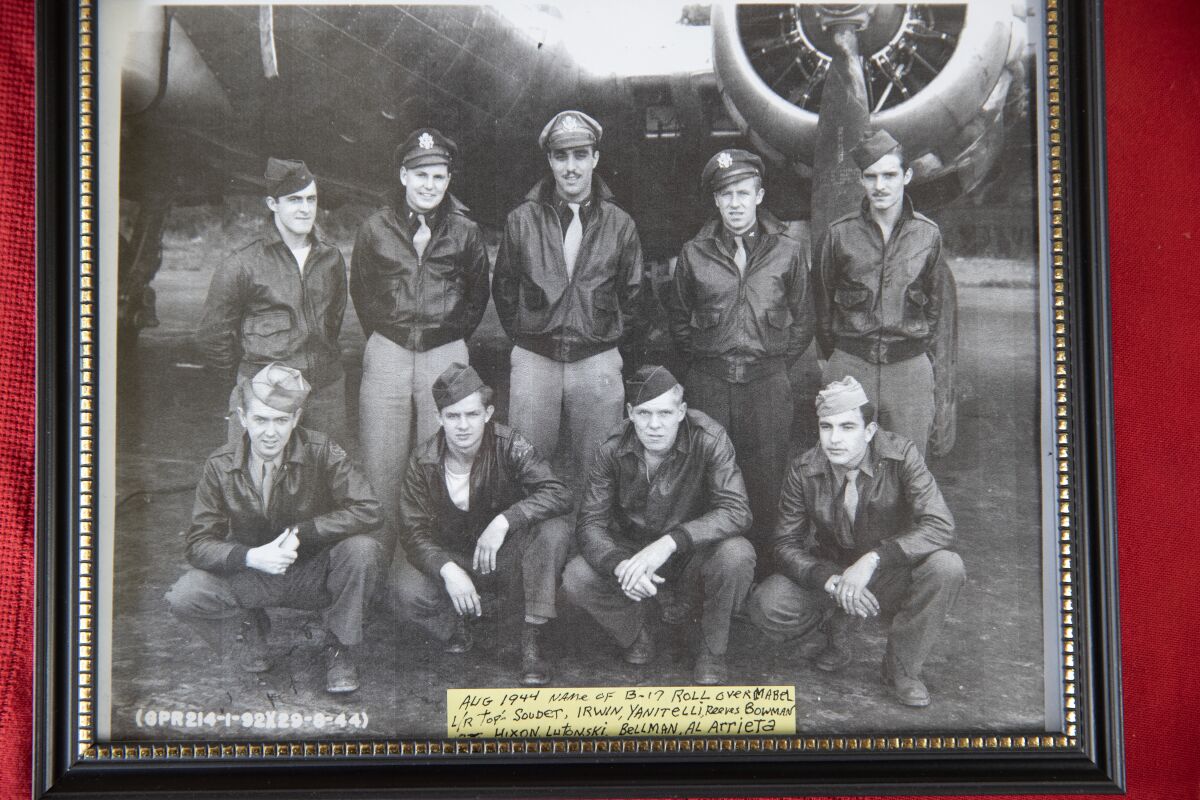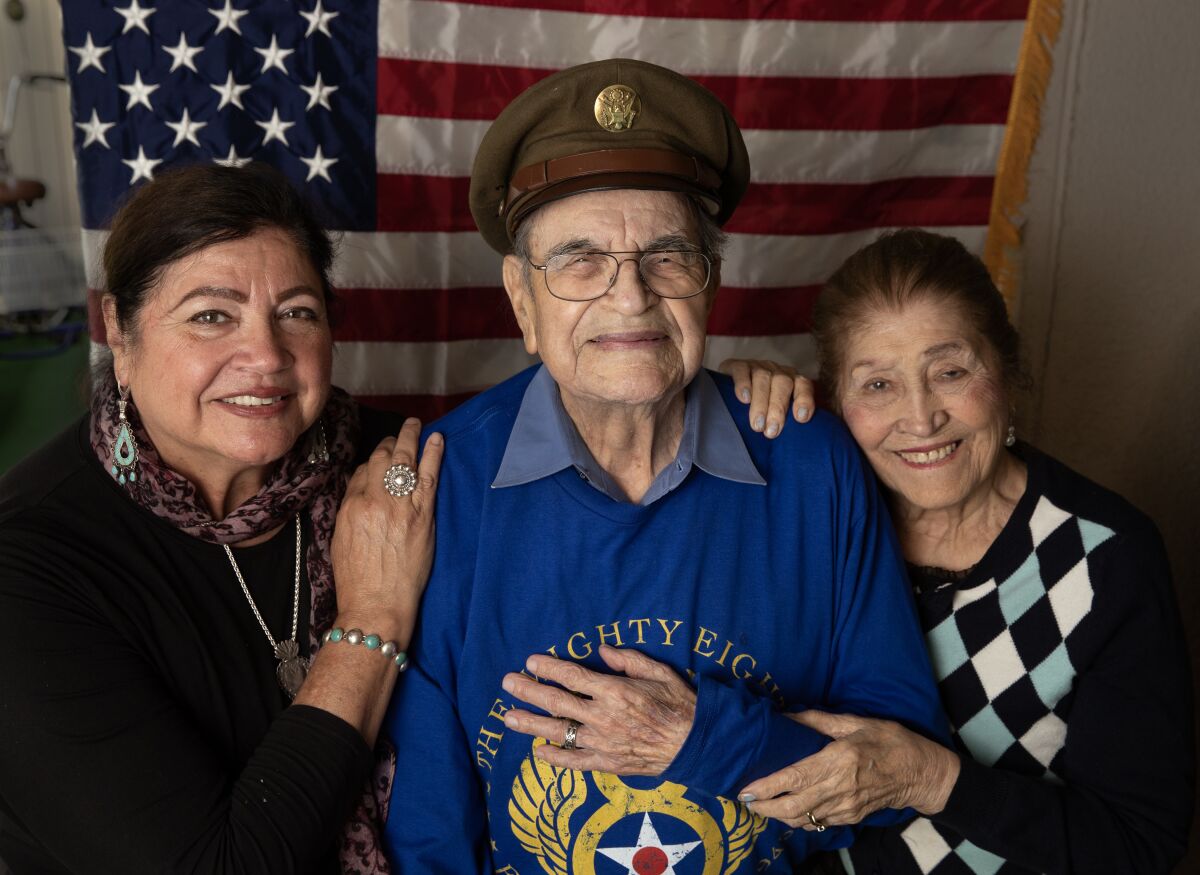It was Christmas Eve 1944 and Alfred Arrieta was among a nine-member crew aboard a B-17 Flying Fortress, providing support to ground troops in the French countryside during the Battle of the Bulge, one of the bloodiest battles in World War II.
The 21-year-old U.S. sergeant had participated in 28 successful missions but this time would be different. The bomber — nicknamed “Move Over Mabel” — had just dropped its payload over the Ardennes region when it was hit by German antiaircraft artillery about 9,000 feet in the air, Arrieta said.
Several of the crew were hit by shrapnel, including the pilot and a turret gunner, who lost an eye.
Arrieta did his best to aid the gunner, injecting him with morphine as the crew braced for impact. The wounded pilot attempted a crash landing.
“When we hit,” Arrieta said, slamming his hand down onto his knee, “we bounced around about 40 feet [up] and back down again.”
Alfred Arrieta, 100, points to a photo displayed in his home. He turned 100 earlier this month and lives in Leisure World in Seal Beach.
(Allen J. Schaben / Los Angeles Times)
The plane landed somewhere near the Belgian border and the crew were rescued by the Free French Forces.
“I feel fortunate. I made it through the Great Depression, the 20th century and World War II,” Arrieta said recently at his home in Seal Beach as he sat next to his wife, Frances. “I’m here, very grateful and proud of my country.”
Arrieta hit the century mark Tuesday and is looking forward to paying tribute to his fellow servicemen on Monday, Memorial Day. He was recently honored by the Seal Beach City Council and received a customary letter from the president of the United States. The office of U.S. Rep. Katie Porter (D-Irvine) also presented him with an American flag flown over the U.S. Capitol.
Arrieta enjoys reminiscing. When he talks about his war experience, he gradually pulls at the details as though they were in a dream he had the night before.
He said after the plane crashed, the wounded were taken to a hospital but that he and the other men who were not injured found themselves alone in Lille, France.
But they had money. There were several thousand francs stuffed in their escape kits provided by the U.S. Air Force to troops who found themselves in foreign territory.
After their near-death experience, the men rented hotel rooms, slept on beds with comfortable mattresses and drank Champagne.
“We went outside and there was a taxi and I said to the driver, ‘Where are the girls? Dancing?’ ”
The driver took them down a dark road to a warehouse. When the doors opened they found people inside dancing, drinking and celebrating Christmas Eve.
After a few weeks, the crew returned to their active duties and Arrieta went on to fly three more missions with the 8th Air Force.
“But during that time we ate the best food and drank and danced,” he said.

Arrieta is shown at bottom right in a photo dated August 1944 with fellow airmen and the B-17 nicknamed “Move Over Mabel.”
(Allen J. Schaben / Los Angeles Times)
The El Paso native is most proud of his family. After the war, Arrieta went on to marry his wife, Frances. The two have been married for 69 years and raised 10 children together in the city of Hawaiian Gardens near Los Angeles.
Arrieta worked odd jobs to provide for his family but then in 1965 he decided to become a TV repairman. He took night classes twice a week for a year after his regular workday.
He eventually got a job as a technician at Montgomery Ward and went on to open his own repair shop in Norwalk. He did well and managed to retire at 62.
“I’m so proud to see everything he’s accomplished and what he did for my brothers and sisters, because he always managed to be there,” his son Frank Arrieta said. “He always made sure to come to our baseball games.”

Alfred Arrieta with his wife, Frances Arrieta, 89, right, and one of his 10 children, daughter Gloria Arrieta-Sherman.
(Allen J. Schaben / Los Angeles Times)
Alfred Arrieta’s family had little when he was growing up and he credits his father, who died when Arrieta was only 6 years old, for his work ethic and family values.
He said he can still see his father, Aparicio, walking down the road at the end of the day after working at a local railroad company. Arrieta would run to meet him and eat the burrito or whatever was left in his father’s lunchbox, only now realizing that his father had saved the food just for him.
“He would hold my hand and I would be smiling, eating that burrito,” Arrieta said.

Alfred Arrieta and his wife, Frances Arrieta, at their Seal Beach home.
(Allen J. Schaben / Los Angeles Times)
He said he also remembers his mother, Maria Garcia, cooking meals and selling them to faculty at his school during the Great Depression.
Arrieta likes to play old Spanish boleros for his children, the same type of music his mother listened to on the radio when he was a child. She particularly liked the singer Agustin Lara, but Arrieta found the music a bit old-fashioned.
It was only when he got older and listened to the lyrics that he realized that he just needed time to grow up to appreciate the music.
At 100, Arrieta maintains a growing playlist he listens to on his phone. His favorite song is “Solamente Una Vez” (Only Once) by Lara.
On his front porch, his daughter Gloria Arrieta-Sherman plays the song from her phone and Arrieta gets a glint in his eye as the lyrics float in the air.
I loved in my life,
Only once
And nothing more.
“Every night, I listen to that continuously,” he said.
Arrieta tells another story, then smiles, grateful that someone asked about his life.
“Thank you, because you have awakened my memory,” he tells a visitor. “Good times, bad times. Good old times.”
This story originally appeared on LA Times

